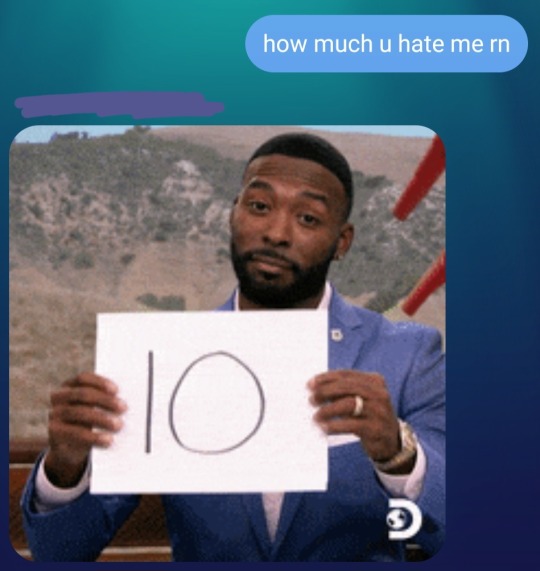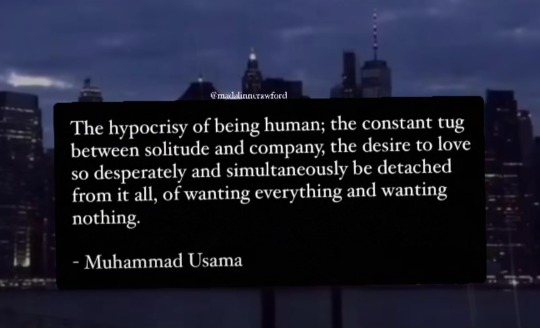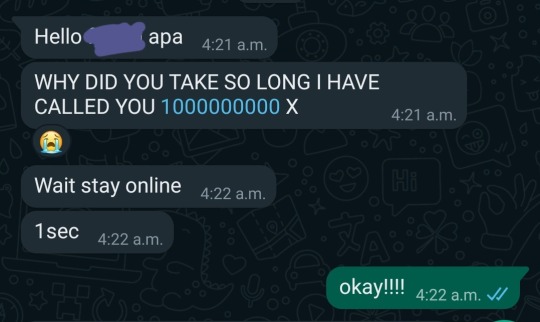#sorry guys I got anxiety that triggered my fight or flight response and I choose flight 8/10 times
Text





finally replied to some people today!!! and GOD I just need to remind myself that it's always infinitely more daunting in my head and the outcome after actually replying is so much more pleasant and bearable than just letting the task build up. knowing myself I'm gonna forget this in hmmmm let's say a month? but rn the clarity feels good so ima relish it 🧘🏻♀️
#the last ss is from my almost 10 yr old cousin 😭#we used to vid call almost every day since I got back from visiting him in the UK#but then Ramadan kind of disrupted that routine and I did my thing and created a mental block in replying/reaching out etc etc#but anyway I was most nervous about damaging that relationship bc he's just a little kid yk and with my friends I can be like#sorry guys I got anxiety that triggered my fight or flight response and I choose flight 8/10 times#and they'll be like ya ok#but what do you say to a kid#but alhamdulillah man I'm so relieved things are so normal and he's even talking about coming to Canada this summer maybe#we just video called for 20 mins and he showed me a magic trick and showed me his cat showed me how he can still fit under his bed#it was just normal!!!#the 2nd last image is from a reel a friend sent in an attempt to show that they understand what I must feel 🥲
1 note
·
View note
Note
The best universe AU where they visit the carnival and Ritchie wants to go in the funhouse/mirror house and Bill remembers his dream and is like “nope. No. Bad idea. No. nononononono” and they manage to calm him down and convince him it’s fine and they all have fun
As always, this is my favorite AU ever and you can find more of it here!
*
“Okay, run this by me again, why are we doing this?”
See, Richie's asking because he's not sure a carnival is the sort of place he'd like to be right now. Or, you know, ever.
“Exposure therapy?” Bev suggests with a hopeful shrug.
“I mean,” Eddie snorts, frowning at the bright colorful lights, “we all do need therapy, but I'm not sure a licensed professional would approve of this.”
“Man,” Ben commiserates, looking sadly at the Ferris wheel, “can't believe that clown ruined this for us.”
“Let the record show, I still think this is a bad idea,” Stan huffs.
“We could still go back to my place and get wasted?” suggests Mike, and man, that sounds like a way better idea.
“We c-came all this way,” Bill argues, sounding either stubborn or determined, Richie can’t quite tell the difference, “we can't g-go back now.”
“Dude, this is like, two blocks away from the townhouse,” he rolls his eyes, hands stuffed in the pockets of his jacket, “it's really not that far.”
Bill doesn’t dignify that with an answer, not that Richie had expected him to, what with the way he’s staring at those neon signs like Pennywise has personally put them there overnight. And it’s not even like Richie can blame him, really, when this fucking cheerful music is giving him the creeps, reminding him too much of the sewers and that goddamn clown dancing in its own fucking circus.
A shudder runs down his spine and Richie shakes his head, feels Eddie brush his fingers against his, eyebrows raised in a silent are you okay? They don’t hold hands because while it’s not the 80s anymore, a couple got beaten up just two weeks before right here, and honestly, they’ve gotten enough fight last time to last for a lifetime. It sucks and it reminds Richie why he had been so far up in the closet, he’d been living in fucking Narnia, and any other time, any other day, he’d be uncomfortable as shit, but Eddie’s here, close enough he can smell his cologne, hands brushing as they walk, and that’s– well, it’s not okay, but it’s not so bad. Once they’re out of Bumfuck, Nowhere, it’ll be better.
There’ll be better days, an infinite number of them.
“Okay,” he says loudly, clapping his hand in forced excitement, “are we gonna stand here like creeps until someone calls the cops on us or are we gonna freaking do this?”
“Richie’s right,” Bill concedes, then immediately makes a face, “c-can’t believe I’ve just said that.”
“Huh, it happens once in a while,” Eddie shrugs, “even a broken clock is right twice a day, you know.”
“Why do you hurt me so?” He asks dramatically, wiping fake tears from under his glasses and swooning into Bev’s arms. She laughs, looping her arms around his, fondly says, “beep beep, Richie.”
They move as a group like a pack of gazelles or something, and that must be weird as fuck to an outsider view, but hey, they ain’t about to give up the whole safety in numbers shtick, nossir. Around them, the air smells like cotton candy and buttery popcorn, children run past them squealing and giggling, tired parents dragging themselves after, and the bright lights paint everything in red and white and blue.
Technically, it’s pretty.
Theoretically, it’s pretty whimsy.
By all means, there’s nothing particularly off about it.
Still, Richie can’t help feeling uneasy about the entire thing. Eddie’s sticking close to him, fidgety and jumpy, and Ben seems to be about to crush Bev’s fingers. Not even Mike, the one who stayed, who lived his whole life in this place, is looking too happy to be there, sandwiched between Bill and Stan.
Jesus Christ, they must be looking so fucking shady, they’re gonna end up being kicked out soon.
“We should, uh,” Ben clears his throat, eyes glancing around nervously, “check out at least one of the rides. Right?”
“Righty-O, Benny Boy,” Richie slips into one of his Voices not to draw attention to his own anxiety, “how about the funhouse? Some wacky mirror fun?”
And you know, he’s sure, Richie was so sure, oh man, he had been so sure he hadn’t said anything wrong this time, no stuffing his foot in his mouth, just some stupid impression of a bad Australian accent from a dude he saw in Cali once, but he still feels stupidly guilty when Bill chokes on his Coke.
“No,” Bill hisses so vehemently, eyes going wide and furious, like it triggered his flight or fight response and boy, did he choose fight. “No, no one’s g-going in there, absolutely not! Promise me,” he latches onto Richie’s arms, glaring and so goddamn scared at the same time, Richie doesn’t even have to ask to know that this has something to do with Bill’s nightmare, with IT. Nothing causes a reaction like thinking about Pennywise. “Promise me, you’re not g-gonna go there, Richie– guys, we can’t, it’s– just, everyone, p-promise me, alright?”
“Okay, okay,” Stan pries Bill away gently, murmuring assurances in that quiet way of his, and they all trade a determined look. It’s not like anyone was truly interested in some dumb mirrors anyway. “No funhouse, we promise, Bill. Okay? See, we’re all still here.”
“Sorry,” Bill rubs at his eyes, runs a hand through his hair, and damn, he looks tired, “I’m sorry, I didn’t mean to freak out.”
“It’s cool, man,” Mike rests a comforting hand on his shoulder, warm with understanding, “nothing to be sorry for. How about some food instead?”
“Do you even– food! In this place!” Eddie huffs, someplace between indignant and alarmed, cheeks puffed adorably, “did they even have a healthy inspection? Did you see how many pigeons were here this afternoon? Do you want food poisoning, Mike? Is that it? You know what else you can get from contaminated food? Salmonella. Salmonella, Mike. Do you want all these years of not eating cookie dough go to waste?”
Heart swelling and chest feeling too small to contain all the unbridled affection that bubbles, Richie really is a goner. Look at him, it’s Eddie’s time to shine, and if Richie didn't know any better, he’d say Mike knew exactly what he had been doing.
“The man makes a compelling argument, Mikey,” Richie grins, delighted, and slings an arm over Eddie’s shoulder. It earns him a half-hearted scowl like Eddie wants to be mad, but really can’t. “Think about the cookie dough you have most definitely not been eating!”
“That’s– I really don’t like the way you said that,” Eddie shakes his head, pained, “I know what you’re implying, and it’s distressing.”
Out of the corner of his eyes, Richie sees Bill smile, small and tentative, and thinks Mike just might be a clever bastard after all. Either way, if it means he gets to tease Eddie into looking unfairly adorable ruffled, well– Richie’s more than happy to oblige.
#it chapter 2#reddie#richie tozier#eddie kaspbrak#it#the losers club#bill denbrough#beverly marsh#ben hanscom#mike hanlon#stan uris#look an ask#it tag#reddie tag#best timeline au
43 notes
·
View notes
Text
When It Comes to Trauma, Belief Really Is a Sledgehammer
by Don Hall
On nearly a daily basis I’d have to have ‘the talk’. The population of Thurgood Marshall Middle School in Chicago was filled with seventh and eighth grade kids from broken families, whose fathers and uncles were in prison, all angry that society (if they thought about those larger elements at play at all) didn’t seem to care.
I wasn’t black. I wasn’t Latino. I didn’t grow up in a gang family. I did have what can be called traumatic experiences in my life. The first stepfather was a domestic abuser who would frequently pummel my mother and myself out of nothing but a male dominated rage. My first sexual experience was when I was nine years old at the hands of a fourteen year old babysitter and her friend. There was some serious drugs in my system before I hit puberty. Too many failed father figures. A lot of school bullying.
Even back in the 90’s people looking for reasons to fix blame on others for their hardships was prevalent so ‘the talk’ was a reality check for these kids. First was the rude awakening that, for the most part, no one really cared how hard these kids had it. Sure, their parents cared in some cases. A few teachers of note. But the rest of the world, while they might signal their concern, didn’t have enough personal stake or attention to genuinely care about these individual students and their traumatic existences.
Harsh, I know, but true nonetheless. The second part of the dialogue centered on how they perceived their rough times. I believed as I believe today that our relationship to pain is largely determined by our beliefs about pain. I’ve found that belief is more powerful than truth every time and, if one truly frames trauma with long-term suffering, those experiences become both a debilitating obstacle and a crutch to excuse failure.
By simply reframing trauma as a learning experience that, like building muscle or endurance, takes the effort to overcome with it and foment personal growth instead of infirmary, these often horrifying quagmires of life can transform into positives.
Did Americans change following the September 11 terrorist attacks? We provide a tentative answer with respect to the positive traits included in the Values in Action Classification of Strengths and measured with a self-report questionnaire available on-line and completed by 4,817 respondents. When scores for individuals completing the survey in the 2 months immediately after September 11 were compared with scores for those individuals who completed the survey before September 11, seven character strengths showed increases: gratitude, hope, kindness, leadership, love, spirituality, and teamwork. Ten months after September 11, these character strengths were still elevated, although to a somewhat lesser degree than immediately following the attacks.
SOURCE
As it turns out some research tells us that the vast majority of those caught in a moment of trauma — from having bombs blowing up around them for days at a time in combat, to violent rape, to physical abuse — tend to see these terrible circumstances as opportunities to learn. The rest rely upon them like diseases afflicting them for the better part of their lives.
Why? If it’s as simple as reframing your relationship to trauma to turn it into a gain rather than a subtraction, why would anyone choose otherwise?
On my right arm, just inside the wrist, is a tattoo that says “This is Water.” It is the title of the David Foster Wallace commencement address that posits that we are all surrounded at all times by humans that we misunderstand. The speech resonates with me and serves as a reminder that the guy who balks about wearing a mask is still a human being, that the woman screaming in the street that there is no justice for Breonna Taylor is a person, that the universal truth is that we are all almost exactly the same.
The most difficult challenge for me most days, as I am assailed with the customers of a low-rent casino and hotel just off the dwindling Las Vegas Strip, is to find that DFW sentiment while fighting back the impulse to just give in and despise people. The weight of my own personal disdain for humanity run amok is fueled by encounters with, in my snap judgment, fucking idiots and grown up children clawing for attention or a hand out or what they perceive as the treatment they deserve.
When I am my most Spock-like, I can navigate these moments more effectively. Things like “Do you believe that complaining this loudly is going to get you what you want?” float out of my masked mouth. On a recent phone call with a man apoplectic that he wouldn’t be served unless he wore a mask, railing at me about how he was going to sue me, sue the casino, sue the corporation, I listened for maybe five minutes before I asked “Sorry to cut you off but I’m curious. What do you want to happen at the end of this phone call? Do you believe that your anger, your demands, and your threat of litigation will change the policy of the casino for you?”
Why would anyone choose to be debilitated by a past trauma rather than reframe it into a learning experience? Maybe because reframing is fucking hard. According to most therapists, the initial reactions to trauma tend to be depression, a feeling of helplessness, a perpetual trigger to the Fight or Flight response, severe anxiety. When saddled with that noxious cocktail, how simple then is finding a lesson for growth?
The knee-jerk response is that they gain a certain power from being seen as a victim. It isn’t a kind reaction and it assumes a predetermined motivation but it’s there nonetheless. There is a sense of belonging when putting on the letter jacket of victimhood, a joining of the masses of people who boast about their anti-depressants like frat boys bragging about how drunk they got, a club of angry, unhappy, traumatized and broken people with which to feel less alone.
Because in a world of social media, alone and different is perhaps the worst one could be.
Then I stare at my right wrist. My inner David Foster Spock quietly informs me that the knee-jerk response is almost always wrong when it comes to assigning motivations to monolithic stereotypes. He tells me to be less judgmental and more specific at the same time.
Why would someone sexually harassed or racially profiled by the police or beaten by someone trusted choose to allow that experience to define their ability to navigate the world? Because belief is stronger than truth. Because believing that you are broken is tacit permission to be broken. While being broken hurts, believing that pain must include suffering and being crippled infinitely is simply easier than believing the alternative.
The choice isn’t to wear victimhood like a blood-soaked bowling shirt. The choice is to believe that there is no growth from pain.
And so ‘the talk.’
First, no one really cares how hard it is to be you. For all the protests, hashtags, and GoFundMe’s, everyone around you cares far more about themselves than they do your trauma. Harsh but true nonetheless.
Second, it is harder to believe that pain can garner strength but it is truly the only way forward. Anything less is giving up. Anything less is acquiescing to the brutality of existence.
0 notes